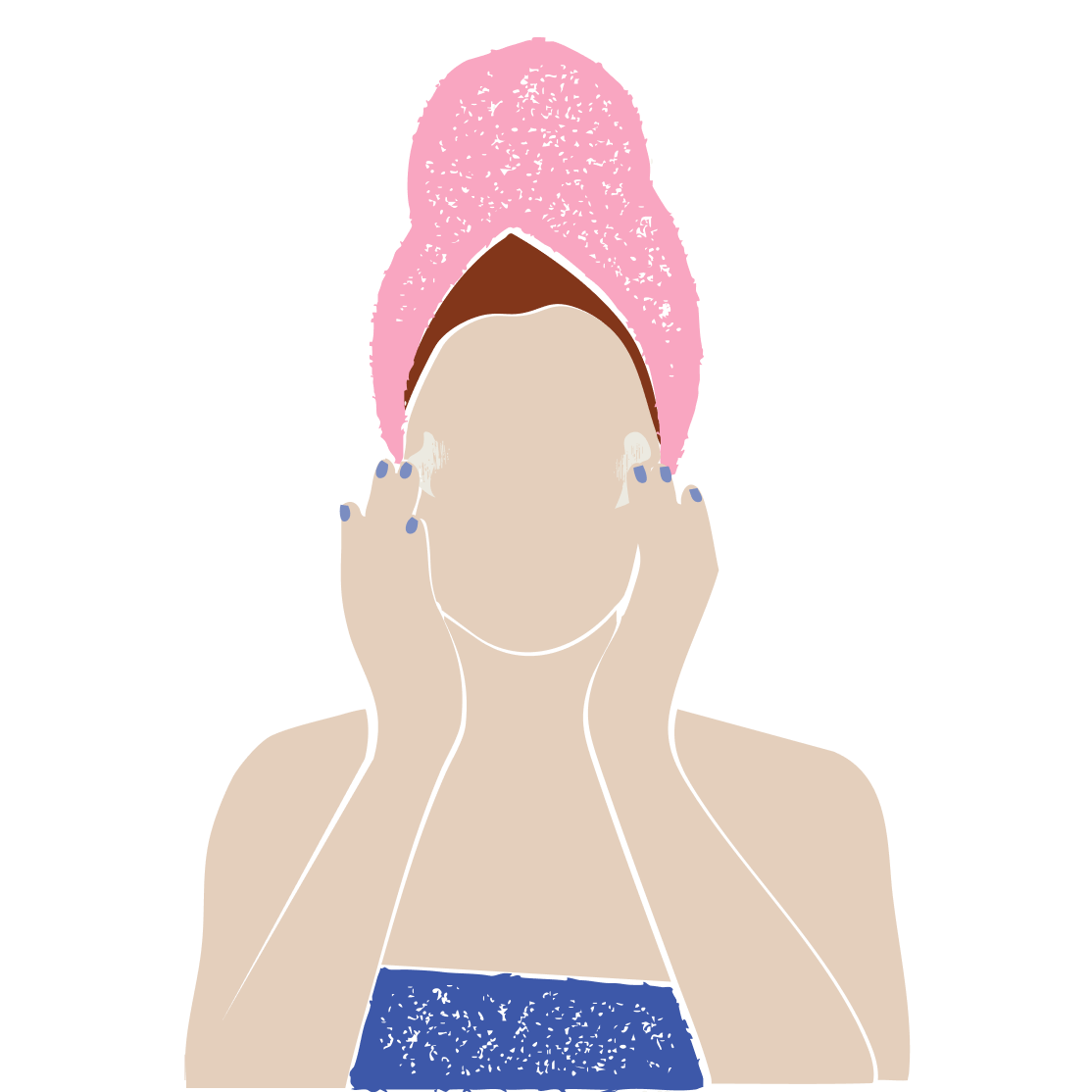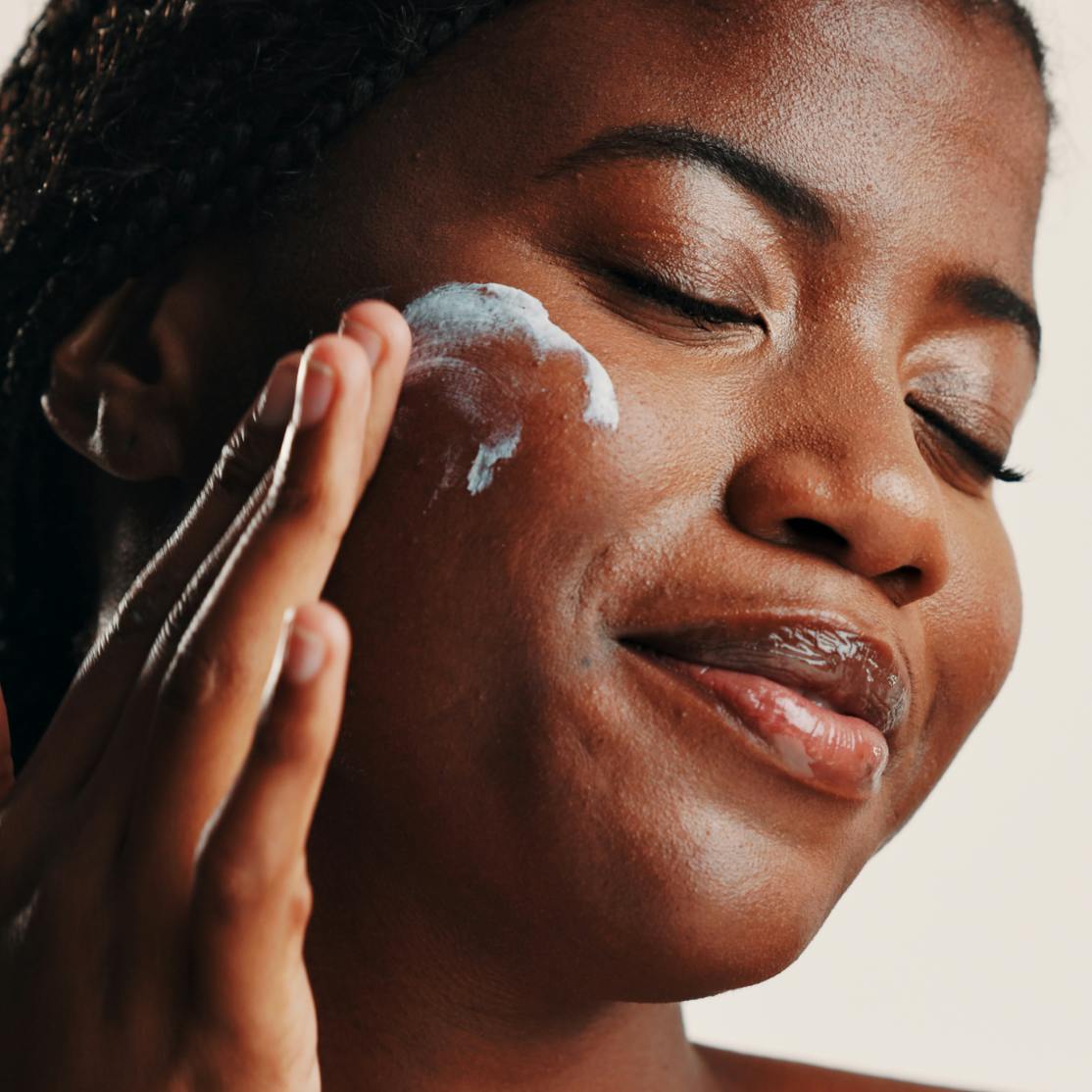Looking for the best skin care for menopausal skin? You’re not alone. Menopause can trigger a host of symptoms that may be confusing and sometimes disconcerting. Your whole body is in a time of transition, and that includes its largest organ: your skin. Even if you’ve never dealt with dryness or acne before, you might suddenly be facing both at once. As your body navigates this major hormonal shift, it’s very common to experience everything from hot flashes to joint pain to a complexion that’s unrecognizable.
The legendary movie star Bette Davis is often credited with saying, “Aging is not for sissies.” Well, neither is menopause. The skin changes it can bring are real—and, for many women, frustrating. Think: dryness, unexpected breakouts, fine lines, and sagging. So what exactly is going on with your skin during this stage of life? And more importantly, what can you do about it
Ahead, we’ll break down the best skin care for menopausal skin and share a skin care guide packed with expert-backed ingredients that can help you manage everything from dryness to wrinkles—all from the comfort of home.
Let’s start with what’s happening beneath the surface.
Understanding Menopausal Skin Changes
Hormonal changes leading to collagen and elastin loss
The upheaval of hormones during perimenopause (the years leading up to official menopause) is a little like puberty in reverse. When progesterone and estrogen begin their slow, jagged decline, your skin may start to reflect those shifts in the form of breakouts, dryness, dullness, and hyperpigmentation. You may also notice some fine lines and skin laxity (sagging) due to a decrease in collage and elastin—the structural proteins that keep skin firm, plump, and elastic.
Why? Estrogen acts like a messenger, signaling skin cells to produce more collagen. Less estrogen = less collagen.
Increased dryness and decreased skin barrier function
If it feels like your go-to moisturizer suddenly isn’t cutting it, you’re not imagining things. Estrogen is the cause here, too.
As levels of the hormone fall, your skin produces less hyaluronic acid and fewer ceramides—the natural compounds that keep skin hydrated, supple, and resilient. Without them, the skin barrier weakens, making it harder to hold onto moisture and easier for irritants to sneak in.
The result: Skin that feels dry, tight, and more easily irritated, even if dryness was never an issue before. It’s one of the most common (and frustrating) skin shifts during menopause. But the right ingredients can help restore what’s been lost.
Common Menopausal Skin Concerns: From fine lines to adult acne
A few things happen simultaneously during perimenopause: Hormone shifts (especially the decrease of estrogen) cause changes to your skin, while the natural aging process slows down the production of important compounds like collagen, elastin, and natural lipids.
In fact, studies show that collagen can decrease as much as 30% in the 5 years following menopause. This may lead to:
- more dryness, fine lines, and sagging
- slower skin cell turnover, causing dead skin cells to build up and dull your glow
- hormonal acne
We know—it’s a lot. But here’s the good news: Every one of these skin concerns can be addressed with the right menopause skin care routine.
Recommended Skin Care Products for Menopausal Skin
As we’ve covered, lower levels of estrogen during perimenopause and menopause trigger a series of changes: Collagen and elastin production drops, skin cell turnover slows, and natural hydrators like HA and ceramides diminish. The result is a complexion that may feel drier, duller, and less firm than it once was.
This just means you need a skin care routine that works smarter—and harder. The best products for menopausal skin are those that deeply hydrate, support collagen production, and encourage gentle exfoliation to keep skin bright and pores clear. Think: an estriol face cream to replenish some of the lost hormone, hydrating serums with HA, barrier-repairing creams rich in ceramides, and multitasking tretinoin to boost firmness and accelerate cell turnover.
Now’s the time to lean into richer, more emollient formulas and thoughtful layering—like a serum followed by a retinol lotion and a nourishing night cream. In menopause, consistent moisture and active ingredients are your skin’s best allies.
These Midi Health products are at the top of our list:
Estriol+ Face Cream
This targeted face cream is formulated with estriol, a gentle type of estrogen shown to boost collagen and elastin production in menopausal skin. When applied topically, estriol helps reduce fine lines, improve firmness, and restore hydration—without significantly affecting hormone levels in the body, making it a safe option for most women.
The formula is enhanced with HA for deep, lasting moisture, and dimethylaminoethanol (DMAE) to help brighten and even out skin tone. Together, these ingredients support a smoother, plumper, and more radiant complexion.
Tretinoin Active Renewal Cream
Tretinoin is a gold-standard retinoid known for accelerating cell turnover and boosting collagen production—revealing smoother, clearer, more even-toned skin. It helps reduce fine lines, fade discoloration, and treat adult acne at the source.
Midi’s formula goes beyond the basics by combining tretinoin with clinically backed ingredients: tranexamic acid to help fade dark spots and melasma, niacinamide to brighten and calm redness, and panthenol to hydrate and soothe any dryness or irritation often associated with retinoid use. The result: a powerful yet balanced treatment that supports healthier, more resilient skin over time.
Hydroquinone Even Tone Cream
Dark spots and uneven skin tone are often the result of aging and sun exposure, as pigment-producing cells (melanocytes) become larger and more active over time—especially in skin areas frequently exposed to UV light.
Hydroquinone works by reducing melanin production and minimizing the number of melanocytes in the skin, helping fade existing dark spots and prevent new discoloration from forming. This targeted treatment is a dermatologist-recommended solution for brightening stubborn pigmentation and restoring a more even, radiant complexion.
7 Essential Ingredients for Menopausal Skin Care
No matter what products you choose, make sure they’re full of all the right ingredients to help you see positive changes in your skin. Start with these:
Hyaluronic acid (HA) is a lubricating substance that occurs naturally in your body. It’s a water-binding humectant, which means that it attracts moisture to the surface of your skin, giving an instant plumping and hydrating effect. Research notes that the production of natural HA in the skin starts to decrease as early as age 25, so it’s a good idea to replenish it topically with skin care products.
Estriol (E3), when used in a topical estrogen cream formulated for the face, has been shown to improve collagen and elastin levels in menopausal women, as well as moisturizing the skin. When applied to your face, estriol can help minimize fine lines, as well as plump and tighten skin. E3 is the weakest of the three estrogen hormones, and it doesn’t increase the level of hormones circulating throughout your body when used topically. This makes it a safe option for most women.
Ceramides are the natural lipids found in your skin, and, like hyaluronic acid, they decrease over time. Here’s a useful analogy to understand the role ceramides play: If the skin barrier is made up of skin cells (picture them as the bricks), then ceramides and fatty acids are the supportive mortar. When this structure is intact, it keeps water in and irritants out. But when it’s disrupted, microscopic cracks form, causing inflammation and irritation. Emollient ceramides help seal in hydration (from humectants like hyaluronic acid) to keep your skin barrier intact and healthy.
Retinol is a chemical derivative of vitamin A. It’s a milder over-the-counter (OTC) analog of prescription retinoids like tretinoin. Research has proven that prescription-strength tretinoin penetrates the skin’s inner layer and acts directly on skin cells to prompt the production of collagen and elastin. It also regulates cell turnover and the healthy shedding of dead skin cells to help keep pores clear and brighten dull skin. Plus, numerous studies have shown that retinol may improve signs of photoaging (skin aging caused by UV exposure), like wrinkles, brown spots, and sagging. It does this by regulating skin cell turnover and stimulating collagen and elastin production.
Peptides are short chains of amino acids that serve as building blocks for proteins like collagen. Peptides and polypeptides (either synthetic or made from plants) as topical ingredients have been linked to stimulating collagen production. For sensitive skin that can’t tolerate a retinoid, a peptide product is a good plan B because peptides tend to be gentle and nonirritating.
Niacinamide, a form of vitamin B3, is a multipurpose skin care ingredient that’s clinically proven to deliver lots of skin-related benefits. Research suggests it can increase hydration in the upper layers of the skin. It also has anti-inflammatory and antioxidant properties that may reduce redness and help protect against the breakdown of collagen.
Vitamin C is a superhero antioxidant that defends skin from toxic free radicals that result from environmental damage (like UV rays and pollution) and destroy collagen and elastin. Topical vitamin C in the form of ascorbic acid may reduce hyperpigmentation and help brighten skin. It’s also been proven to help stimulate collagen production, so it’s a win-win-win.
Daytime Skin Care Routine for Menopausal Skin
No time for a 10-step routine? This simple, science-backed 4-step approach is effective and achievable—even on your busiest days.
- Cleanse gently: Start with a mild, nonstripping cleanser that removes impurities without disrupting your skin’s natural barrier. Avoid harsh soaps and gritty scrubs—these can dry out already dehydrated skin and throw off your skin’s pH balance, which can increase the risk of inflammation and irritation.
- Apply a serum: Layering a serum onto just-washed skin is an effective way to deliver ingredients like HA or niacinamide to increase hydration or complexion-brightening vitamin C to help neutralize free radicals.
- Layer on your estriol cream: Topical estriol helps improve skin elasticity and reduce the appearance of fine lines by stimulating collagen and enhancing hydration. This will support long-lasting moisture and a firm, plump complexion as you go about your day. (You can also use this at night if you prefer—apply it after retinol.)
- Moisturize with sunscreen: A daily moisturizer with broad-spectrum SPF is essential every single day (yes, cloudy ones included). Dermatologists universally agree that the single best thing you can do to prevent damage like brown spots and wrinkles and protect collagen and elastin degradation is to protect your skin every day with sunscreen. Plus, if you’re adding valuable active skin care ingredients, such as retinol, exfoliating acids, or estriol, to your routine, it’s even more important to use SPF diligently because those products can make skin more vulnerable to UV light.
Nighttime Skin Care Essential Add-Ons
- Retinol or retinoid: After cleansing, apply a prescription retinoid (like tretinoin) or an OTC retinol to boost collagen and elastin, improve skin texture, and keep pores clear. This gold-standard ingredient targets fine lines, laxity, hyperpigmentation, and hormonal acne by speeding up cell turnover. Retinol is recommended for nighttime use because the ingredient tends to make the skin sensitive to light, especially from the sun. (Another reason why daily SPF is so important.) It’s also recommended to start gradually, starting a few times a week and working up to nightly as your skin adjusts.
- Rich moisturizing cream or lotion: Layer on a nourishing cream that contains humectants like HA and glycerin to bring moisture to your skin, as well as emollients like squalene and ceramides to seal in that hydration. Following retinol with a moisturizer that also contains peptides gives a double boost to your skin’s collagen-building potential.
- Eye cream: It can really make a difference when used day or night because it hydrates the delicate, thin skin around your eyes. Bonus: An eye cream with hydrating HA also temporarily plumps up fine lines, like crow’s feet, instantly.
Weekly Skin Care Treatments
- Gentle exfoliation helps slough off dead skin cells, but the key is not to overdo it. If you’re applying a retinol or a retinoid a few nights per week, you’re already getting an exfoliating effect, so you don’t need to add another exfoliating step more than once per week. Make sure you use a gentle chemical formulation with glycolic acid, an alpha hydroxy acid (AHA) that’s associated with boosting collagen production. The bottom line: You can have both retinol and an AHA in your weekly routine, but don’t go overboard and it’s generally recommended to alternate these potent ingredients to avoid skin irritation.
- Hydrating face masks are a great way to deliver and lock in moisture. It’s also a smart follow-up step after gentle chemical exfoliation to help counter potential dryness or irritation. Look for a face mask that’s packed with hydrating HA, glycerin, and anti-inflammatory aloe to calm as well as moisturize your skin.
Lifestyle and Dietary Tips for Healthy Menopausal Skin
When it comes to skin care, it’s all about playing the long game. And that means focusing on more than just what’s in your product rotation. A holistic approach will benefit your skin and help you manage a host of menopause symptoms.
Prioritize a Balanced Diet
We don’t have to tell you that eating a nutritious daily diet of fruits, vegetables, fish, and whole grains will do your body good, but the effects can also have a ripple effect on your appearance in a positive way. You want to boost your intake of essential elements like protein, healthy fats, and antioxidants that boost skin health. Even though eating foods like olive oil or salmon doesn’t bring those fatty acids directly to your skin like a cream does, they do supply your skin with the building blocks it needs to stay healthy. And getting a good supply of antioxidants—such as polyphenols in green tea or vitamin C in oranges—is thought to be just as good for your skin when you eat them as when you apply them topically.
Hydrate
Water is essential to the skin’s metabolism and regeneration, but it doesn’t hydrate your skin directly. Like the food you eat, the liquid you drink doesn’t go straight to your skin to moisturize it but it is beneficial for skin barrier function.
Exercise Regularly
Getting your heart pumping with walking or hiking increases blood circulation to the skin. This is the conveyor belt that replenishes everything your skin needs, including oxygen and nutrients. Not only does regular exercise have the potential to boost skin health, it can also help reduce stress and other menopause symptoms.
Get Enough Sleep
Without adequate rest, your skin doesn’t get the chance to repair itself. While you sleep, blood flow shifts to your skin and gets busy building more collagen, draining toxins, and repairing damage. A small study from 2015 suggests that sleep deprivation may disrupt skin barrier function and increase visible signs of aging. While getting the recommended 7-plus hours of shut-eye per night can be challenging, especially at midlife, it’s essential to keeping your skin healthy.
Manage Stress
Stress releases the hormone cortisol, which increases heart rate and blood pressure and suppresses the immune system. It also impairs the skin barrier, increases chronic inflammation, and can aggravate skin issues like acne. Why? When cortisol levels rise during stress, it triggers the sebaceous glands to produce more oil, which can result in more breakouts. Finding de-stressing techniques that work for you, like simple deep breathing or meditation, can boost skin health and your overall well-being.
Common Skin Care Mistakes During Menopause
Overexfoliating and aggressive skin care practices
The fix: Midi clinicians warn against overdoing it with harsh scrubs and chemical exfoliators. Be wise with your use of exfoliating acids, as well as active ingredients like retinoids and vitamin C. Don’t layer products with these active ingredients or use them on the same night. This can do more harm than good and can lead to irritation of the skin’s protective barrier.
Skipping sunscreen
The fix: Apply a broad-spectrum sunscreen every single day without fail. It’s important to know that up to 80% of signs of aging in your skin come from UV light, such as from unprotected sun exposure. Sun protection is just that: It protects your precious collagen supply from breakdown, it prevents hyperpigmentation (like sunspots), and is your best safeguard against skin cancer.
Ignoring neck and décolletage
The fix: Sun damages every part of your skin, including your neck and chest. UV rays don’t just cause brown spots—they also destroy collagen and elastin, the proteins that make your skin firm and flexible. The smart rule of thumb: Apply your skin care products—including retinol, moisturizers, and SPF—all over your neck and décolletage.
Not personalizing your skin care routine
The fix: Working with a healthcare professional, like a Midi clinician, to figure out exactly what your skin needs to thrive. There are individual needs that can appear in midlife, which need expert assessment and treatment. Whether you’re struggling with hormonal acne, hyperpigmentation, or rosacea, each of these conditions benefit from specialized ingredients. Afterall, two to four products per routine with the right ingredients for your skin is usually sufficient for most people and avoids the potential for irritation and interactions between the different ingredients. Consistency over time with a few evidence-supported products is likely to make the biggest impact long term.
Key Takeaways
- Estrogen loss during perimenopause reduces collagen, elastin, hyaluronic acid, and ceramides—leading to dryness, fine lines, and hormonal acne.
- Now’s the time to get proactive: Targeted skin care can significantly improve menopausal skin issues.
- Moisturize at every step with hydrating cleansers, serums, and rich creams to restore the skin barrier.
- Use a retinol or prescription tretinoin regularly to boost collagen, increase cell turnover, and clear pores.
- Consider adding a topical estriol cream to help firm, plump, and deeply hydrate aging skin.
Frequently Asked Questions (FAQs)
What do dermatologists recommend for menopausal skin?
Doctors suggest focusing on a good menopause skin care routine that includes essential ingredients like collagen-boosting retinol, hydrating hyaluronic acid, and estriol face cream. Now is the time to get serious about moisturizing and using the right active ingredients, like gold-standard tretinoin.
What is the best face cream for menopause?
At night, a face cream that contains retinol or one that has peptides (you can alternate between them every other night) will help boost collagen production as it moisturizes and restores your skin barrier. During the day, be sure to protect your skin (and your precious collagen supply) by wearing a daily moisturizer with broad-spectrum sun protection of SPF 30 at the minimum.
What is the best thing for menopausal skin?
Moisturize at every step and boost collagen topically with a retinol product. Protect your skin with SPF every single day, and don’t neglect your neck and décolletage area. Treat your neck like your face—with collagen-stimulating peptides and retinol, protective SPF, and lots of moisturizing lipids and emollients because the skin on your neck is thinner than on your face.
What is the best skin care for aging skin over 50?
Now is the time to be proactive about preventing damage (like brown spots and fine lines) with diligent daily SPF on your face, neck, and any exposed areas of skin. Using an antioxidant vitamin C product can help defend your skin and protect your collagen from UV damage, too. And get serious about building collagen by using skin care products that contain retinol, peptides, and estriol. Finally, use hydrating and moisture-replenishing products at every step of your skin care routine to support a healthy protective barrier, plump the skin (and fine lines), and counter dryness.
If you’re in perimenopause or menopause and want guidance from clinicians who specialize in women’s midlife health, book a virtual visit with Midi today.
Hormonal change is at the root of dozens of symptoms women experience in the years before and after their period stops.
Our trained menopause specialists can help you connect the dots to guide you towards safe, effective solutions.
Whether you need personalized guidance or a prescription routine to tackle symptoms—including brain fog, hot flashes, sleep trouble, mood swings, and weight gain—we’ve got you covered. Learn more here.
Midi’s mission is to revolutionize healthcare for women at midlife, wherever they live and whatever their health story. We believe that starts with education, to help all of us understand our always-changing bodies and health needs. Our core values guide everything we do, including standards that ensure the quality and trustworthiness of our content and editorial processes. We’re committed to providing information that is up-to-date, accurate, and relies on evidence-based research and peer-reviewed journals. For more details on our editorial process, see here.


 Kristen Wolfe, MD
Kristen Wolfe, MD



